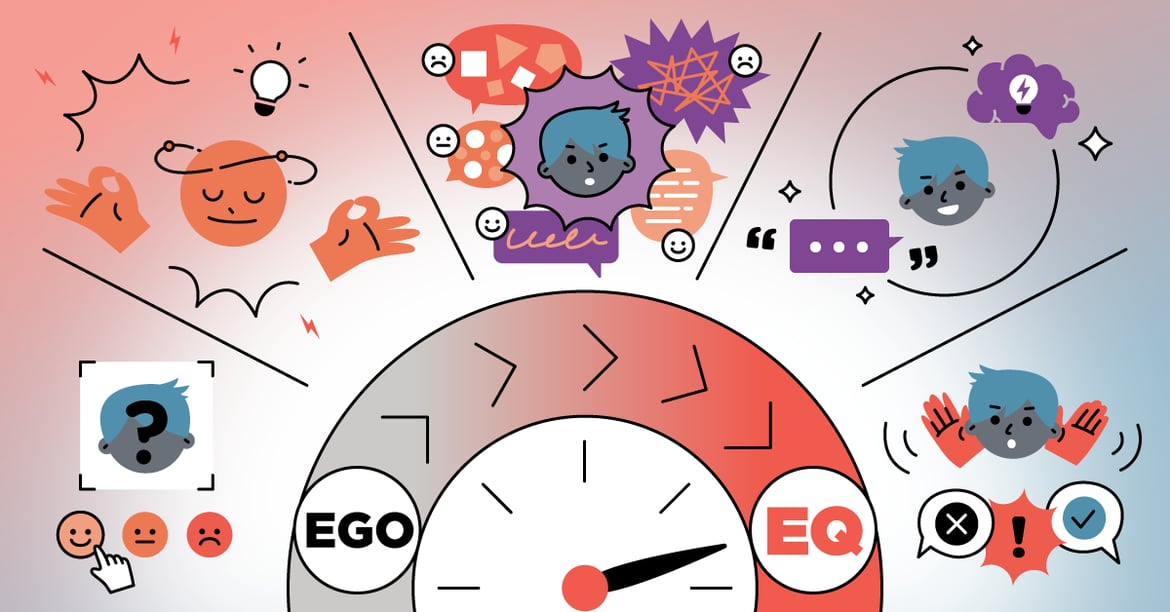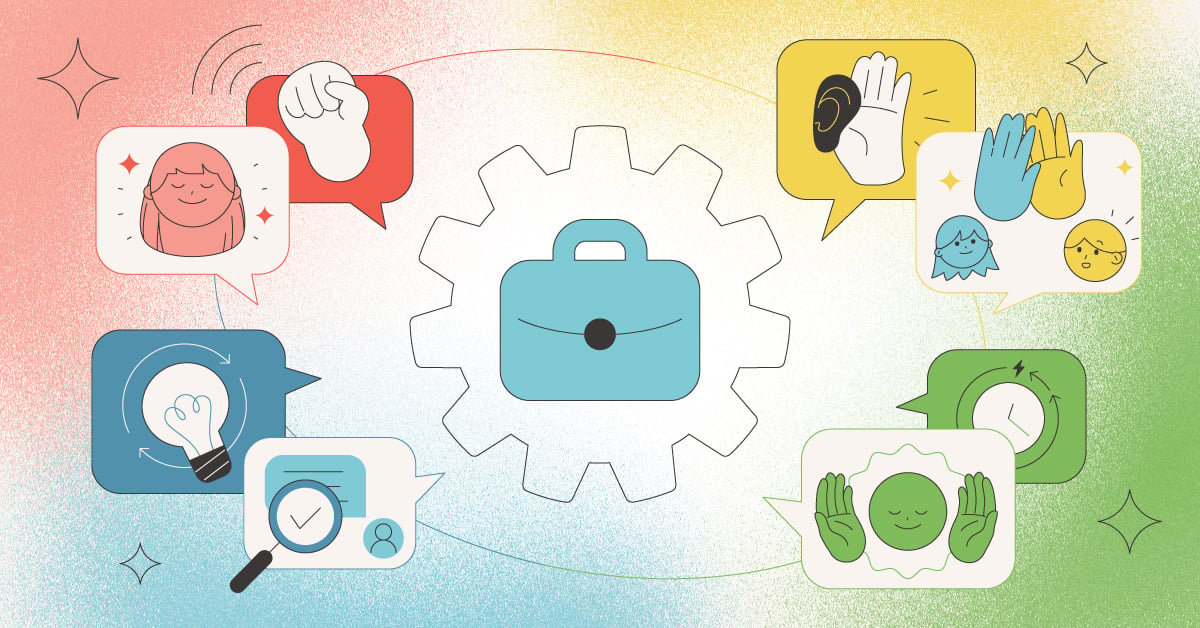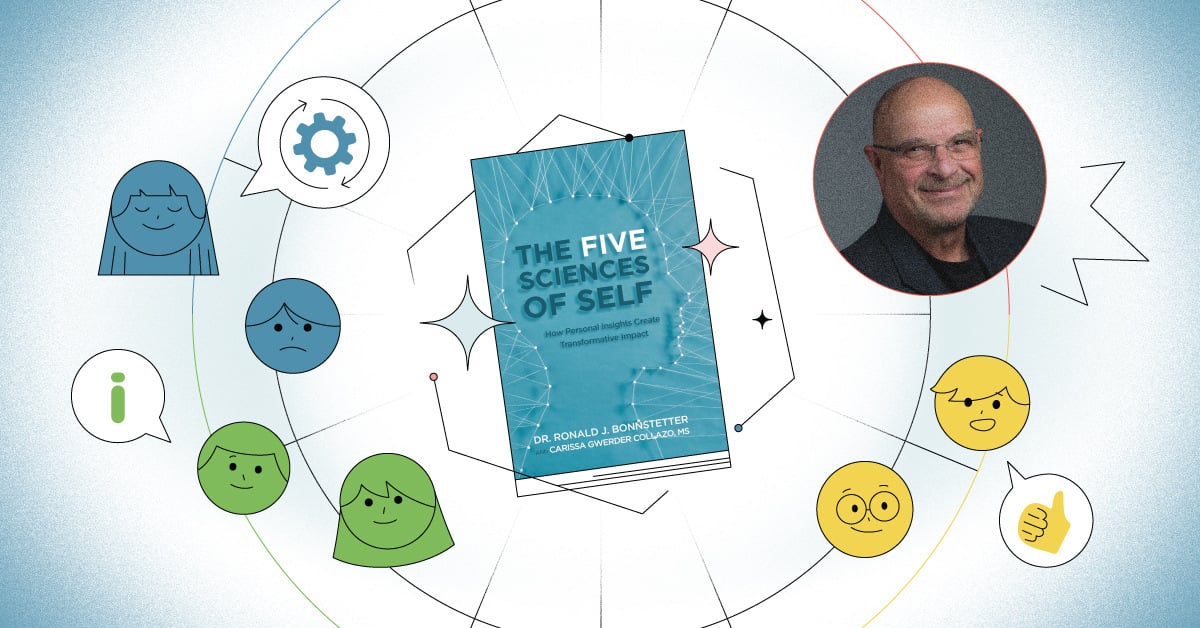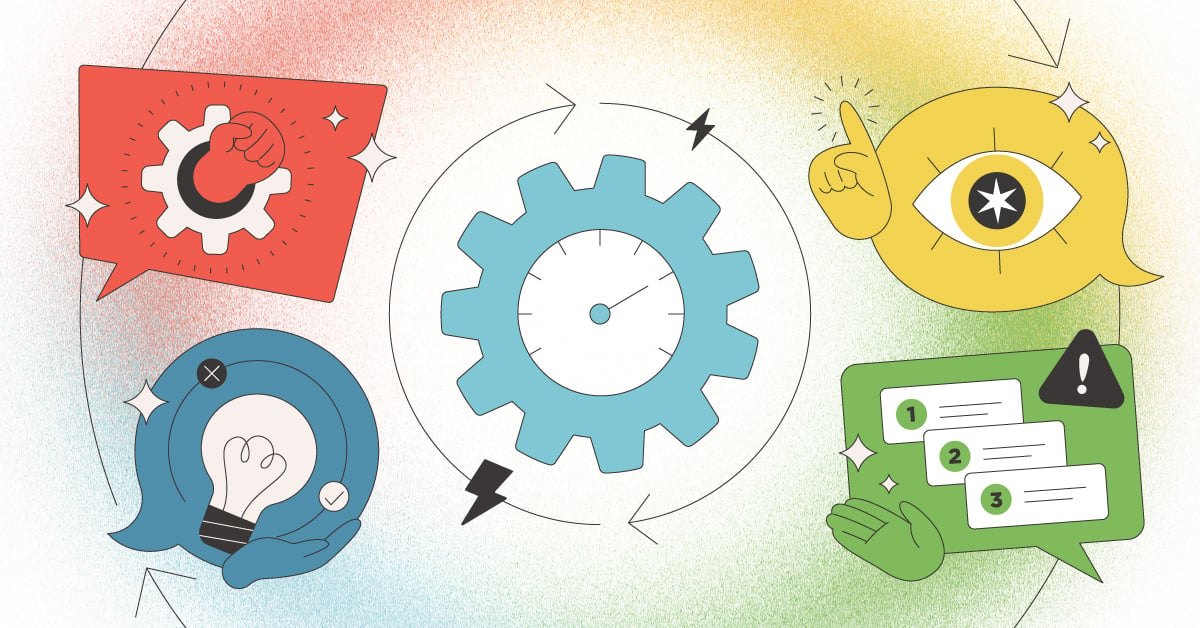
Ego and emotional intelligence (EQ) are terms that get thrown around a lot, but you might be surprised at how linked the two are. How are they defined?
Let’s look at what ego and EQ really are, how EQ can combat egocentric thinking, and why that matters in the workplace.
What Exactly Is Your Ego?
According to Vocabulary.com,
“Your ego is your conscious mind, the part of your identity that you consider your ‘self’. If you say someone has 'a big ego,' then you are saying he is too full of himself.”
Ego isn’t necessarily negative, but it does have a negative cultural connotation and can derail your life without developing emotional intelligence to balance it out.
How Does EQ Relate To Ego?
Emotional intelligence is the ability to sense, understand and effectively apply the power of acumen of emotions to facilitate higher levels of collaboration and productivity.
Having a big ego or an inflated sense of self is likely to get in the way of your emotional development. If you have a high estimation of yourself, you might be content to ignore areas that could benefit from development and developing EQ requires digging into your weaknesses and turning them into opportunities. It’s all about increasing awareness and regulation of your emotions, which can be difficult when ego gets in the way.
“A fundamental character trait required to develop high levels of emotional intelligence is humility,” said Ron Price, President of TTI Success Insights. “We have all known leaders who were smart, maybe even charismatic, who didn’t have much self-awareness or self-regulation. Their ego becomes a blind spot that keeps them from seeing their impact on those around them. A leader who has been driven by ego to arrive at their current position of authority is at a great disadvantage when it comes to developing emotional intelligence.”
If you’re looking to challenge yourself and maybe even change your point of view and the way you approach yourself and others, EQ is your best bet. Here are the ways each of the five dimensions of EQ can help you drop your ego.
Self-Awareness
Self-awareness is the ability to recognize and understand your moods, emotions and drives. It’s a foundational skill that the other factors build off of; if you don’t have self-awareness, it’s very difficult for you to understand and regulate your own behavior.
If someone has an overinflated ego, they usually have an elevated sense of self. This means that they overestimate the importance of their own emotions, reactions and desires to other people. More likely than not, others aren’t hanging on your every word or basing their decision making around you. This is because most people are most focused on themselves: their internal world and emotions taking precedence over yours.
That’s alright! Improving your self-awareness will help you more accurately identify your emotions and make more tempered decisions. It will help you gain perspective about your reactions to others and your experiences in the world. “One of the keys to mindset management is the understanding of self,” said Dr. Ron Bonnstetter, Vice President of Research and Development at TTI SI. Therefore, self-awareness is foundational to recognizing and when necessary, controlling one's ego”
Notice what he says there; the first step when dealing with your ego is to recognize it. Ego doesn’t necessarily need to be tamped down or controlled; it’s a natural part of your psyche and identity. It just might get out of hand on occasion and need to be recognized. That’s what self-awareness is all about.
Self Regulation

Self-regulation is the ability to control or redirect disruptive impulses and moods and the propensity to suspend judgment and think before acting. It’s a skill we use on a day-to-day basis to manage our emotions at the moment that an event occurs— it lets us take thoughtful actions.
When you’re approaching decision making from an egotistical point of view, you’re obviously more likely to center yourself in those decisions. Improving your self-regulation will help you objectively examine difficult situations and not become emotionally compromised by them.
Remember that your emotions and reactions are just that: yours. They aren’t the objective truth and they might not be the same for the people around you. Take a more observational approach and try to gather information and consider others before acting on your feelings.
Social-Awareness
Social awareness is the ability to understand the emotional makeup of other people and how your words and actions affect others. It’s about picking up cues from the people around you to ‘read the room’.
We’ve all been around someone with poor social awareness. The telltale signs: not realizing or caring about your volume level while speaking, dominating conversation, not listening to others and ignoring their body language. The person with underdeveloped social-awareness can be abrasive, insensitive, and egotistical.
Even if they genuinely aren’t intending that, their actions tell a different story. Developing social awareness can improve trust, collaboration and communication as well as your personal understanding of the way emotions impact your decision making.
Social Regulation
Social-regulation is the ability to influence the emotional clarity of others through proficiency in managing relationships and building networks.
It’s implicitly tied to social awareness— social awareness is about ‘reading the room’ and social regulation is about reacting and responding to others in an effective way.
“Without genuine humility, it is very difficult to develop social awareness or social regulation,” said Ron Price. “Whether driven by insecurity (feeling badly about yourself) or narcissism (feeling too good about yourself), ego-centricity doesn’t work in today’s world where relationship capital is the greatest source of success and fulfillment.”
Someone with a big ego might vastly overestimate their influence over others. Sure, they might be able to overpower others in conversation and decision making in the short term, but that creates dislike and distrust in the long term. People giving in to their demands can be out of desperation, not respect, and that’s a very difficult situation to rectify
Developing social regulation helps hone the ability to understand others’ points of view as well as develop relationship-building skills and speaking skills. That element of understanding is key to battling ego.
Motivation
Motivation addresses the emotional value and satisfaction that comes from pursuing goals with energy and persistence. It’s the internal factor that drives an individual to make decisions and complete challenges.
Motivation is also the key to tackling all ego-based decisions. If you don’t understand the necessity of changing your behavior, any self-development is unlikely to stick with you for the long term. Others can make requests, employers can put you in coaching and development, you can attend therapy; none of that will be as effective as it could be if you yourself are not motivated to succeed.
Improving motivation makes you more receptive to feedback as well as a better listener and innovator. It will also give a boost to all other dimensions of your EQ; there’s a reason it’s on the outside of the circle in the TTI SI graph!
Moving Forward With EQ (And Without Inflated Ego!)
It can be tricky to discern your ego from your sense of self, and confidence from arrogance. The good news is that just by learning more about emotional intelligence, you are becoming more aware of your own behavior and motivation.
“Our ego is like a target we carry with us. And like any target, the bigger it is, the more vulnerable it is to being hit. In this way, an inflated ego makes it easier for others to take advantage of us,” said Harvard Business Review. “Because our ego craves positive attention, it can make us susceptible to manipulation. It makes us predictable. When people know this, they can play to our ego. When we’re a victim of our own need to be seen as great, we end up being led into making decisions that may be detrimental to ourselves, our people, and our organization.”
You’re already ahead of the curve by learning about these concepts and increasing your understanding, but don’t stop now! Here are a few articles that can help you continue on the path to developing your EQ.




